从句的类型
从句9种全

从句9种全从句是指在复合句中作为独立成分的句子。
根据从句的功能和结构,可以将从句分为多个类型。
本文将介绍完整版从句的九种常见类型,包括:1. 名词性从句:名词性从句可以充当主语、宾语、表语或同位语。
例如:“他说他会来”中的“他会来”是一个宾语从句。
2. 定语从句:定语从句用来修饰名词或代词。
它通常放在被修饰的名词或代词之后。
例如:“我喜欢的书是你给我的那本”中的“你给我的那本”是一个定语从句。
3. 状语从句:状语从句用来修饰动词、形容词或副词,表达时间、地点、原因、条件等信息。
例如:“因为下雨,我没有去游泳”中的“因为下雨”是一个状语从句。
4. 同位语从句:同位语从句用来解释或说明名词的具体内容或性质。
例如:“我听说他被任命为经理”中的“他被任命为经理”是一个同位语从句。
5. 结果从句:结果从句用来表达某个行动或情况的结果。
例如:“她太累,以致于睡着了”中的“以致于睡着了”是一个结果从句。
6. 条件从句:条件从句用来表示某个条件下可能发生的情况。
例如:“如果明天下雨,我们就不去郊游了”中的“如果明天下雨”是一个条件从句。
7. 原因从句:原因从句用来说明某个行动或情况的原因。
例如:“他失败是因为他不努力”中的“因为他不努力”是一个原因从句。
8. 目的从句:目的从句用来表达某个行动或情况的目的。
例如:“我来找你是为了向你道歉”中的“为了向你道歉”是一个目的从句。
9. 让步从句:让步从句用来表示与主句意思相反的情况。
例如:“尽管下雨了,他还是去了”中的“尽管下雨了”是一个让步从句。
以上就是完整版从句的九种类型,希望对您的写作有所帮助。
英语八大从句类型总结

英语⼋⼤从句类型总结英语⼋⼤从句类型总结 总结就是对⼀个时期的学习、⼯作或其完成情况进⾏⼀次全⾯系统的回顾和分析的书⾯材料,它可以促使我们思考,为此我们要做好回顾,写好总结。
总结你想好怎么写了吗?下⾯是⼩编收集整理的英语⼋⼤从句类型总结,欢迎阅读与收藏。
英语⼋⼤从句类型总结1 1.时间状语从句 (1)When---当……时候,通常指某⼀特定的时间点,主句与从句的动作同时发⽣。
(2)When---正在……的时候,突然…。
通常主句是进⾏时或be about to时,在翻译的时候,when可以译成没想到或突然。
(3)When当从句是进⾏时,主句是⼀般时,往往表⽰不满。
(4)When=after (5)While---在……期间,往往指⼀段时间。
(6)While---表⽰⼀种不满情绪,意思是这边在⼲某种重要的事,⽽另⼀边在享受等。
(7)As---⼀边……⼀边,随着 (8)The moment---⼀……就……=as soon as,immediately, 2.条件状语从句 引导状语从句的连接词有:If如果,unless除⾮,as long as只要,As(so)far as---据……所知,incase万⼀,provided that假如,on condition that若是,以…为条件。
3.地点状语从句 地点状语从句只有两个连词:Where,wherever。
4.原因状语从句 because,as,since,now that,和considering that,seeing that这六个连词都⽤于表⽰表⽰原因,但在语⽓上⼀个⽐⼀个弱。
5.结果状语从句 引导结果状语从句的连词有:that,so that,so…that… 6.⽬的状语从句 引导⽬的状语从句的主要连词有:that,so that,in order that,for fear that,lest. 7. 让步状语从句 引导让步状语从句的连词有:Although,though,as,even if,even though,nomatter,however,whatever,while,whether。
从句的用法归纳总结
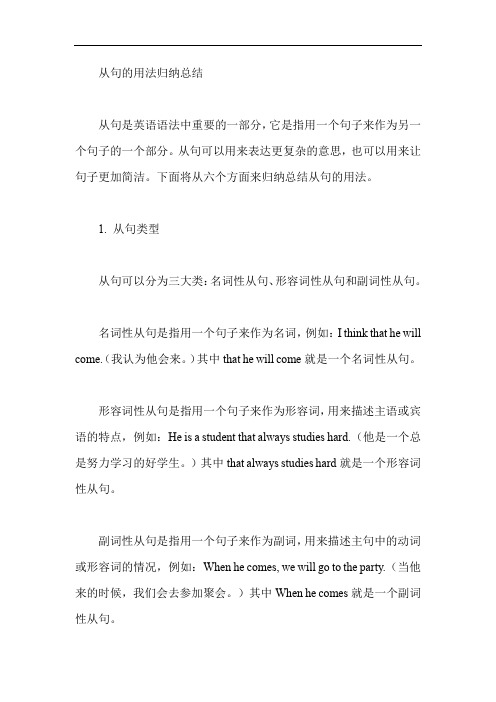
从句的用法归纳总结从句是英语语法中重要的一部分,它是指用一个句子来作为另一个句子的一个部分。
从句可以用来表达更复杂的意思,也可以用来让句子更加简洁。
下面将从六个方面来归纳总结从句的用法。
1. 从句类型从句可以分为三大类:名词性从句、形容词性从句和副词性从句。
名词性从句是指用一个句子来作为名词,例如:I think that he will come.(我认为他会来。
)其中that he will come就是一个名词性从句。
形容词性从句是指用一个句子来作为形容词,用来描述主语或宾语的特点,例如:He is a student that always studies hard.(他是一个总是努力学习的好学生。
)其中that always studies hard就是一个形容词性从句。
副词性从句是指用一个句子来作为副词,用来描述主句中的动词或形容词的情况,例如:When he comes, we will go to the party.(当他来的时候,我们会去参加聚会。
)其中When he comes就是一个副词性从句。
2. 从句引导词从句的引导词有很多种,不同的引导词可以引导不同类型的从句。
常用的引导词有:* that:可以引导名词性从句和形容词性从句,但是不能引导副词性从句;* what:可以引导名词性从句;* who:可以引导名词性从句和副词性从句;* whom:可以引导名词性从句;* which:可以引导名词性从句;* where:可以引导副词性从句;* when:可以引导副词性从句;* why:可以引导名词性从句;* how:可以引导名词性从句和副词性从句。
3. 从句语序在英语中,主句和从句的语序一般是不同的。
主句通常采用陈述语序,而从句则可以采用疑问语序或倒装语序。
例如:Do you know where he lives?(你知道他住在哪里吗?)其中where he lives就是一个名词性从句,采用了疑问语序。
从句的分类与使用方法

从句的分类与使用方法从句是指在句子中充当句子成分的一种句子。
在英语中,从句的分类和使用方法非常重要。
正确地使用不同类型的从句,可以使句子更加准确,表达更加丰富。
本文将介绍从句的分类和使用方法,帮助读者更好地掌握从句的运用。
一、从句的分类从句可以根据其功能和结构的不同分为以下几种类型:名词性从句、形容词性从句和副词性从句。
下面将对这三种从句进行详细介绍。
1. 名词性从句名词性从句在句中充当名词的功能,可以作主语、宾语、表语等。
根据从句引导词的不同,名词性从句可以分为主语从句、宾语从句、表语从句和同位语从句。
主语从句在句子中充当主语的角色,常常以that, whether, if等引导词引导,例如:- Whether he will come to the party remains unknown.- If it rains tomorrow, we will stay at home.宾语从句在句子中充当宾语的角色,常常以that, whether, if, what, who等引导词引导,例如:- He asked me if I had finished my homework.- The teacher told us what we should do.表语从句在句子中充当表语的角色,常常以that, whether, if等引导词引导,例如:- The important thing is that you try your best.同位语从句在句子中对前面的名词进行解释说明,常常以that引导,例如:- The fact that he didn't show up disappointed us.2. 形容词性从句形容词性从句在句中充当形容词的角色,用来修饰名词或代词。
形容词性从句常常以that, which, who等引导词引导,例如:- The book that I borrowed from the library is very interesting.- Do you know the girl who is speaking on the stage?3. 副词性从句副词性从句在句中充当副词的角色,用来修饰动词、形容词或副词。
从句的种类和用法详解

从句的种类和用法详解从句是英语语法中重要的一个部分,由一个主句和一个或多个从句组成。
从句可以增加语言的表达力,使句子更加丰富多样。
本文将详细解释从句的种类和用法,帮助读者更好地理解和运用从句。
一、名词性从句名词性从句在句子中充当名词的功能,可以作主语、宾语、表语或补语。
常见的名词性从句有三种种类:主语从句、宾语从句和表语从句。
1. 主语从句主语从句在句子中充当主语的角色,常以"that"引导。
例如:"That he is late surprises me."(他迟到了让我感到惊讶。
)2. 宾语从句宾语从句在句子中充当动词的宾语,通常由"that"引导,但在口语中可以省略。
例如:"I believe that he will come." (我相信他会来。
)"I know he will come." (我知道他会来。
)3. 表语从句表语从句在句子中充当表语的角色。
例如:"The important thing is that you try your best."(最重要的是你尽力而为。
)二、定语从句定语从句用来修饰名词或代词,常以关系代词或关系副词引导。
定语从句通常紧跟在被修饰的名词或代词之后。
例如:"The man who is speaking is my teacher."(正在说话的那个人是我的老师。
)"The book that I borrowed from the library is interesting."(我从图书馆借的那本书很有趣。
)三、状语从句状语从句用来表达时间、条件、原因、结果、目的、比较等信息,在句子中充当状语的角色。
根据不同的用途,状语从句可以分为六种类型。
1. 时间状语从句时间状语从句用来表示一个动作或事件发生的时间。
考研英语语法:学会辨认六类从句

考研英语语法:学会辨认六类从句从句类型在英语中,经常使用的从句有以下六类:1. 主语从句:一个句子在整个句子中充当主语的成分,该句子被称为主语从句。
2. 宾语从句:一个句子在整个句子中充当宾语的成分,该句子被称为宾语从句。
3. 表语从句:一个句子在整个句子中充当表语的成分,该句子被称为表语从句。
4. 定语从句:一个句子在整个句子中充当定语的成分,该句子被称为定语从句。
5. 状语从句:一个句子在整个句子中充当状语的成分,该句子被称为状语从句。
6. 同位语从句:一个句子在整个句子中充当同位语的成分,该句子被称为同位语从句。
►从句的辨认如果想辨认从句类型,学生们应该对从句的基本形式有所认识。
无论是哪种从句类型,在句子中充当成分的"句子"应该都具备以下特征:从句=从属连词+句子了解了从句的基本结构,那么应该如何辨别从句类型呢?学生可以在句子中通过简单的公式进行辨认。
常见的从句出现形式有四类:1. 名词+从属连词+句子=定语从句/同位语从句2. 动词+从属连词+句子=宾语从句/表语从句3. ×+从属连词+句子=状语从句4. 从属连词+句子+动词=主语从句对于以上四类从句出现形式有了一定的了解,那么今天就首先看看第一类从句出现形式的辨认方法和注意事项吧!1. 名词+从属连词+句子=定语从句/同位语从句例子1:Yet, being friendly is a virtue that many Americans value highly and expect from both neighbors and strangers.(1997年Text2)从句类型:定语从句辨别方式:a virtue(名词)+that(从属连词)+many Americans value highly and expect from both neighbors and strangers(句子)译文:然而,表示友好是一种美德,美国人高度重视这种美德,并期望邻居和陌生人都能有这种美德。
英语八大从句类型与用法总结 有哪些从句
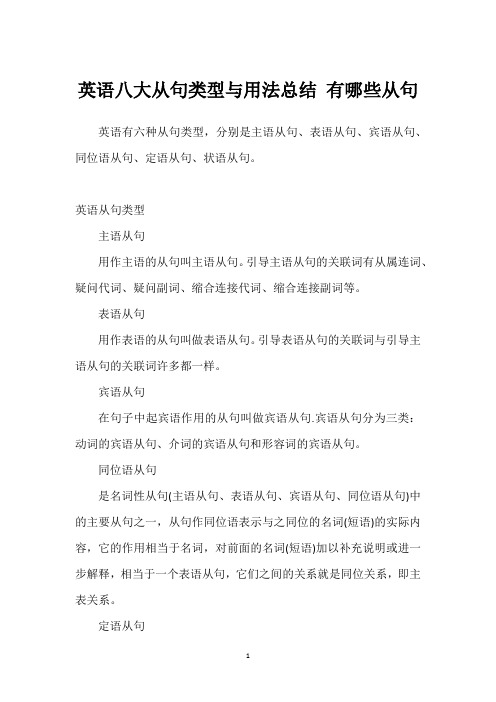
英语八大从句类型与用法总结有哪些从句英语有六种从句类型,分别是主语从句、表语从句、宾语从句、同位语从句、定语从句、状语从句。
英语从句类型主语从句用作主语的从句叫主语从句。
引导主语从句的关联词有从属连词、疑问代词、疑问副词、缩合连接代词、缩合连接副词等。
表语从句用作表语的从句叫做表语从句。
引导表语从句的关联词与引导主语从句的关联词许多都一样。
宾语从句在句子中起宾语作用的从句叫做宾语从句.宾语从句分为三类:动词的宾语从句、介词的宾语从句和形容词的宾语从句。
同位语从句是名词性从句(主语从句、表语从句、宾语从句、同位语从句)中的主要从句之一,从句作同位语表示与之同位的名词(短语)的实际内容,它的作用相当于名词,对前面的名词(短语)加以补充说明或进一步解释,相当于一个表语从句,它们之间的关系就是同位关系,即主表关系。
定语从句是由关系代词或关系副词引导的从句,其作用是作定语修饰主句的某个名词性成分,相当于形容词,所以又称为形容词性从句,一般紧跟在它所修饰的先行词后面。
状语从句可分为:时间状语从句、地点状语从句、缘由状语从句、条件状语从句、目的状语从句、让步状语从句、比较状语从句、方式状语从句、结果状语从句。
英语从句用法1.主语从句1)主语从句可直接位于主语的位置,假如从句较长,谓语又较短,可用it作形式主语,而将从句放在句末。
常见的句型有:2)what引导的主语从句表示“...的东西时”,一般不用it作形式主语。
3)what,who,when,why,whether等词含有各自的疑问意义,但它们引导的主语从句,都用陈述语序。
2.宾语从句1)宾语从句可位于及物动词、介词和某些形容词后。
连词that 常可省略。
介词后一般接疑问词引导的宾语从句。
in that(由于),except that(除了),but that(只是)已构成固定搭配,其他介词后一般不接that引导的宾语从句。
2)宾语从句后如有宾补,要用形式宾语it来代替,而把宾语从句移至宾补之后。
英语从句类型总结
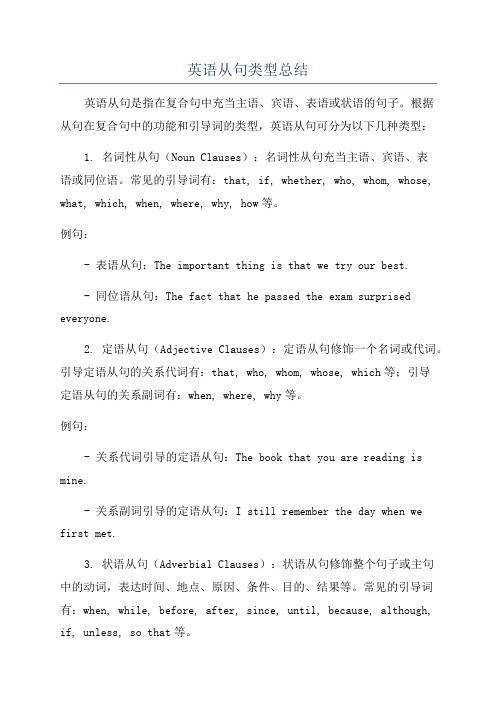
英语从句类型总结英语从句是指在复合句中充当主语、宾语、表语或状语的句子。
根据从句在复合句中的功能和引导词的类型,英语从句可分为以下几种类型:1. 名词性从句(Noun Clauses):名词性从句充当主语、宾语、表语或同位语。
常见的引导词有:that, if, whether, who, whom, whose, what, which, when, where, why, how等。
例句:- 表语从句:The important thing is that we try our best.- 同位语从句:The fact that he passed the exam surprised everyone.2. 定语从句(Adjective Clauses):定语从句修饰一个名词或代词。
引导定语从句的关系代词有:that, who, whom, whose, which等;引导定语从句的关系副词有:when, where, why等。
例句:- 关系代词引导的定语从句:The book that you are reading is mine.- 关系副词引导的定语从句:I still remember the day when we first met.3. 状语从句(Adverbial Clauses):状语从句修饰整个句子或主句中的动词,表达时间、地点、原因、条件、目的、结果等。
常见的引导词有:when, while, before, after, since, until, because, although, if, unless, so that等。
例句:- 时间状语从句:I will call you when I arrive.- 结果状语从句:She studied hard so that she could pass the exam.例句:- He is not as tall as his brother.5. 让步状语从句(Concessive Clauses):表示一种让步关系,常见的引导词有:although, though, even though, while等。
英语的从句类型与用法总结资料

英语的从句类型与用法总结资料从句是由一个或多个词组成的句子,可以作为句子的一部分。
从句有多种类型和用法。
以下是一些常见的从句类型及其用法的总结资料:1. 名词从句(Noun Clauses):- 作主语:What he said was true.- 作表语:The question is whether we should go or not.- 作宾补:She made it clear that she didn't want to go.2. 定语从句(Adjective Clauses):- 用关系代词引导:The book that you borrowed is on the table.- 用关系副词引导:The reason why he left is unknown.3. 状语从句(Adverb Clauses):- 时间状语从句:I will call you when I arrive.- 地点状语从句:He found it where he left it.- 条件状语从句:If it rains tomorrow, we will stay at home.- 目的状语从句:I am studying hard so that I can pass the exam.- 结果状语从句:He didn't study, so he failed the test.- 让步状语从句:Although he was tired, he continued working.4. 原因从句(Causal Clauses):- 用because引导:I am sleepy because I didn't get enough sleep.5. 结果从句(Concessive Clauses):- 用though或although引导:I will go, although it is raining.6. 条件从句(Conditional Clauses):- 用if引导:If it snows tomorrow, we can go skiing.7. 目的从句(Purpose Clauses):- 用so that或in order that引导:I am studying hard so thatI can pass the exam.8. 方式从句(Manner Clauses):- 用as if或as though引导:He looked at me as if I was crazy.以上是一些常见的从句类型及其用法的总结资料。
从句的类型及用法总结

从句的类型及用法总结从句是语言中的一种基本成分,它可以扩展句子的信息量,并使句子更加具体和明确。
从句分为几种类型,包括名词性从句、形容词性从句和副词性从句。
本文将对这些从句的类型及其用法进行总结,并举例说明。
一、名词性从句名词性从句可以在句子中充当主语、宾语、表语或宾语补足语。
名词性从句通常由连接词“从属连词”引导,包括“that、whether/if、who、whom、whose、which、what”等。
1. 主语从句主语从句在句子中充当主语,常以“that、whether/if、wh-”为引导词。
例如:- That he has refused to help surprises me. (他拒绝帮助我,让我感到惊讶)- Whether she will come or not is still uncertain. (她是否会来还不确定) - What he said is true. (他说的是真的)2. 宾语从句宾语从句在句子中充当直接宾语或间接宾语,常以“that、whether/if、wh-”为引导词。
例如:- He knows that you are coming. (他知道你要来了)- I wonder if he can finish the task. (我想知道他是否能完成这个任务) - I don't know what he is talking about. (我不知道他在说什么)3. 表语从句表语从句在句子中充当表语,常以“that、whether/if、wh-”为引导词。
例如:- My wish is that you succeed. (我希望你成功)- The fact that he lied shocked everyone. (他撒谎的事实让每个人都感到震惊)4. 宾补从句宾补从句通常跟在某些动词(如“think、believe、find、consider”等)或介词(如“for、on、about”等)后面,充当宾语的补足语,常以“that、whether/if、wh-”为引导词。
【英语知识点】从句类型

【英语知识点】从句类型英语中从句有6类,分别为:主语从句、表语从句、宾语从句、同位语从句、定语从句和状语从句。
从句,即从属子句,是复句中具有分属地位的分句,它是一种绝大部分语言都有的语法结构。
主语从句用作主语的从句叫主语从句。
引导主语从句的关联词有从属连词、疑问代词、疑问副词、缩合连接代词、缩合连接副词等。
表语从句用作表语的从句叫做表语从句。
引导表语从句的关联词与引导主语从句的关联词很多都一样。
宾语从句在句子中起宾语作用的从句叫做宾语从句.宾语从句分为三类:动词的宾语从句、介词的宾语从句和形容词的宾语从句。
同位语从句是名词性从句(主语从句、表语从句、宾语从句、同位语从句)中的主要从句之一,从句作同位语表示与之同位的名词(短语)的实际内容,它的作用相当于名词,对前面的名词(短语)加以补充说明或进一步解释,相当于一个表语从句,它们之间的关系就是同位关系,即主表关系。
定语从句是由关系代词或关系副词引导的从句,其作用是作定语修饰主句的某个名词性成分,相当于形容词,所以又称为形容词性从句,一般紧跟在它所修饰的先行词后面。
状语从句可分为:时间状语从句(adverbial clause of time)地点状语从句(adverbial clause of place)原因状语从句(adverbial clause of cause)条件状语从句(adverbial clause of condition)目的状语从句(adverbial clause of purpose)让步状语从句(adverbial clause of concession)比较状语从句(adverbial clause of parison)方式状语从句(adverbial clause of manner)结果状语从句(adverbial clause of result)感谢您的阅读,祝您生活愉快。
英语八大从句类型与用法总结 有哪些从句

英语八大从句类型与用法总结有哪些从句英语有六种从句类型,分别是主语从句、表语从句、宾语从句、同位语从句、定语从句、状语从句。
英语八大从句类型与用法总结有哪些从句1英语从句类型主语从句用作主语的从句叫主语从句。
引导主语从句的关联词有从属连词、疑问代词、疑问副词、缩合连接代词、缩合连接副词等。
表语从句用作表语的从句叫做表语从句。
引导表语从句的关联词与引导主语从句的关联词很多都一样。
宾语从句在句子中起宾语作用的从句叫做宾语从句.宾语从句分为三类:动词的宾语从句、介词的宾语从句和形容词的宾语从句。
同位语从句是名词性从句(主语从句、表语从句、宾语从句、同位语从句)中的主要从句之一,从句作同位语表示与之同位的名词(短语)的实际内容,它的作用相当于名词,对前面的名词(短语)加以补充说明或进一步解释,相当于一个表语从句,它们之间的关系就是同位关系,即主表关系。
定语从句是由关系代词或关系副词引导的从句,其作用是作定语修饰主句的某个名词性成分,相当于形容词,所以又称为形容词性从句,一般紧跟在它所修饰的先行词后面。
状语从句可分为:时间状语从句、地点状语从句、原因状语从句、条件状语从句、目的状语从句、让步状语从句、比较状语从句、方式状语从句、结果状语从句。
2英语从句用法1.主语从句1)主语从句可直接位于主语的位置,如果从句较长,谓语又较短,可用it作形式主语,而将从句放在句末。
常见的句型有:2)what引导的主语从句表示“...的东西时”,一般不用it作形式主语。
3)what,who,when,why,whether等词含有各自的疑问意义,但它们引导的主语从句,都用陈述语序。
2.宾语从句1)宾语从句可位于及物动词、介词和某些形容词后。
连词that常可省略。
介词后一般接疑问词引导的宾语从句。
in that(因为),except that(除了),but that(只是)已构成固定搭配,其他介词后一般不接that 引导的宾语从句。
高考从句所有知识点

高考从句所有知识点在语法学中,从句是一个重要的概念,也是高考英语考试中的必考内容。
了解并熟练运用从句的知识点将有助于我们在考试中取得更好的成绩。
本文将介绍高考英语考试中常见的从句类型以及相关的知识点。
1. 名词性从句名词性从句可以在一个句子中充当主语、宾语、表语或补足语等,并且引导词有:that、whether、who、whom、what、which、whoever、whomever、whatever、whichever等。
例如:- We all know that honesty is the best policy.(主语从句)- He asked me whether I would go with him.(宾语从句)- My question is who will take care of the plants when I'm away.(表语从句)- It is important that you come to the meeting tomorrow.(主语从句)2. 定语从句定语从句用来修饰一个名词或代词,一般由关系代词who、whom、whose、which、that或关系副词when、where、why引导。
例如:- The girl who is playing the piano is my sister.(修饰名词)- The book that you borrowed from me is on the desk.(修饰名词)- I still remember the day when we first met.(修饰名词)- The reason why he didn't come to the party is still unknown.(修饰名词)3. 状语从句状语从句用来修饰一个动词、形容词或副词,并且主要由连词引导,包括时间状语从句、条件状语从句、原因状语从句、结果状语从句等等。
从句知识点总结
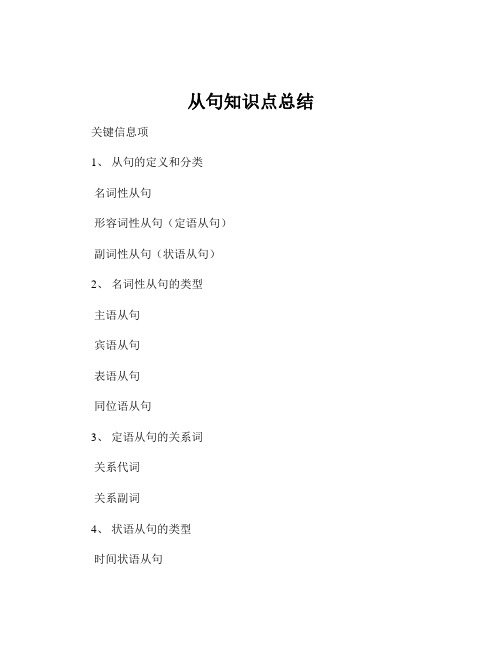
从句知识点总结关键信息项1、从句的定义和分类名词性从句形容词性从句(定语从句)副词性从句(状语从句)2、名词性从句的类型主语从句宾语从句表语从句同位语从句3、定语从句的关系词关系代词关系副词4、状语从句的类型时间状语从句地点状语从句原因状语从句条件状语从句目的状语从句结果状语从句方式状语从句让步状语从句5、从句的引导词及用法6、从句的语序7、从句与主句的时态呼应11 从句的定义从句是指在一个复合句中,不能独立成句,但具有主语部分和谓语部分,由引导词引导的句子。
111 从句的分类从句主要分为名词性从句、形容词性从句(定语从句)和副词性从句(状语从句)三大类。
112 名词性从句名词性从句在句中相当于名词,可分别作主句的主语、宾语、表语和同位语。
1121 主语从句在复合句中充当主语的从句叫主语从句。
引导主语从句的关联词有that、whether、who、what、which、when、where、how、why 等。
1122 宾语从句在复合句中作主句的宾语的从句叫宾语从句。
引导宾语从句的关联词有 that、if/whether、what、who、whom、whose、which、when、where、how、why 等。
1123 表语从句在复合句中作主句的表语的从句叫表语从句。
引导表语从句的关联词有 that、whether、as if/though、what、who、which、when、where、how、why 等。
1124 同位语从句在复合句中用于解释说明前面某一名词内容和实质的从句叫同位语从句。
引导同位语从句的关联词有 that、whether、how、when、where 等。
113 定语从句在复合句中,修饰某一名词或代词的从句叫定语从句。
被修饰的名词或代词叫先行词,定语从句一般放在先行词的后面。
1131 关系代词关系代词有 that、which、who、whom、whose 等,在定语从句中作主语、宾语、定语等成分。
英语从句辨析50个例句

英语从句辨析50个例句英语从句是英语语法中的一个重要部分,主要包括名词性从句、定语从句和状语从句。
以下是50个例句,用于帮助辨析不同类型的英语从句:一、名词性从句1、主语从句:What he said is not true.(他说的不是真的。
)2、宾语从句:I don't know if he will come.(我不知道他是否会来。
)3、表语从句:The question is who will go there.(问题是谁会去那里。
)4、同位语从句:The news that he resigned was surprising.(他辞职的消息令人惊讶。
)5、主语从句:Whether he will come or not remains uncertain.(他是否会来还不确定。
)6、宾语从句:I doubt whether he can finish the task on time.(我怀疑他是否能按时完成任务。
)7、表语从句:The question is when we should start the project.(问题是我们应该何时开始这个项目。
)8、同位语从句:The fact that she won the prize was a great honor for her family.(她获奖的事实对她家来说是一种极大的荣誉。
)9、The question whether we should proceed with the project remains unanswered. (我们是否应该继续这个项目的问题尚未回答。
)10、It's a fact that the company is going through a tough period. (公司正在经历困难时期,这是事实。
)11、The reason why he resigned was not made public. (他辞职的原因没有公开。
从句在句子结构中的位置是怎样的?

从句在句子结构中的位置是怎样的?1. 从句的定义与分类从句是构成复句的一个核心成分,具有主谓结构,可以独立完成一定的语法功能。
根据从句的不同功能,可以分为主语从句、宾语从句、表语从句、定语从句和状语从句等多种类型。
1.1 主语从句:位于主句谓语动词之前,充当主语的成分。
1.2 宾语从句:通常位于主句动词之后,充当主句谓语动词的宾语。
1.3 表语从句:位于主句谓语动词之后,充当主句的表语。
1.4 定语从句:位于名词或代词之后,用来修饰名词或代词。
1.5 状语从句:位于主句之前或之后,用来表示原因、条件、目的、结果等。
2. 从句在句子中的位置从句在句子结构中的位置取决于从句的种类和功能,一般可以分为紧跟主句、置于主句之前和置于主句之后三种情况。
2.1 紧跟主句:主语从句和宾语从句经常紧跟在主句之后,与主句构成一个完整的复句结构。
2.2 置于主句之前:表语从句和定语从句常常位于主句之前,修饰主句的主语或宾语。
2.3 置于主句之后:状语从句通常位于主句之前或之后,用来表达主句中的时间、原因、条件等相关信息。
3. 从句的语法功能与意义从句在句子中承担了重要的语法功能和意义,丰富了句子的表达方式,增加了句子的信息量和层次。
3.1 描述性句子:通过定语从句和表语从句,可以提供更加详尽的描述信息,丰富了句子的内容和意义。
3.2 表达因果关系:状语从句可以表达原因、条件、结果等因果关系,使得句子更加连贯和清晰。
3.3 扩展句子结构:主语从句、宾语从句等从句的加入,可以扩展句子的结构,增加句子的变化和灵活性。
4. 从句的运用技巧和注意事项在使用从句时,需要注意语法结构的正确性和逻辑关系的清晰性,避免产生歧义或表达错误。
同时,还可以根据需要灵活运用从句,以丰富和提高句子表达的效果。
4.1 注意时态和语态的搭配:在使用从句时,要注意从句与主句之间的时态、语态等搭配关系,确保句子整体语法结构的完整性。
4.2 避免过多从句:在句子中使用过多的从句会使句子复杂难懂,应该适当控制从句的数量,保持句子的简洁明了。
英语八大从句类型总结

英语八大从句类型总结主句和从句的划分方法是相同的。
句子的成分从谓语动词处来划分比较容易。
今天我们就一起来看看英语八大从句类型总结吧!从句是相对于主句而言的,即它是从属于某一个主句,而不能单独作一个句子。
在英语中,主要有三大从句,即名词性从句 (包括主语从句,宾语从句,表语从句,同位语从句)、形容词性从句 (即定语从句)、副词性从句 (即状语从句,包括时间、条件、结果、目从句是相对于主句而言的,即它是从属于某一个主句,而不能单独作一个句子。
在英语中,主要有三大从句,即名词性从句(包括主语从句,宾语从句,表语从句,同位语从句)、形容词性从句(即定语从句)、副词性从句(即状语从句,包括时间、条件、结果、目的、原因、让步、地点、方式等)。
主语从句用作主语,如::That the earth is round is true. 地球为圆的是真实的。
宾语从句用作宾语。
如:Do you know where he lives?表语从句用作表语,如:My opinion is that you should not go alone. 我的意见是你不应单独前往。
同位语从句用于解释说明前面的名词。
如:The fact that the earth is round is true. 地球是圆的的事实是真实的。
(that从句用于解释说明the fact)定语从句相当于一个形容词,用于修饰前面的名词。
如:The student who answered the question was John. 回答问题的学生是John.状语从句相当于一个副词,如:When it rains, I usually go to school by bus. 天下雨时,我通常坐公共汽车上学。
(时间状语) If he comes tomorrow, you will see him. 如果他明天来,你就可以看见他。
(if 引导的条件状语从句,其结构为:if +状语从句,+主句)。
从句的类型及引导词总结
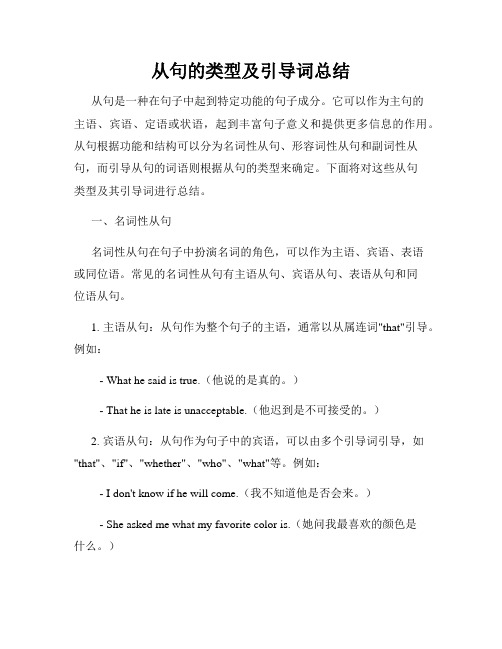
从句的类型及引导词总结从句是一种在句子中起到特定功能的句子成分。
它可以作为主句的主语、宾语、定语或状语,起到丰富句子意义和提供更多信息的作用。
从句根据功能和结构可以分为名词性从句、形容词性从句和副词性从句,而引导从句的词语则根据从句的类型来确定。
下面将对这些从句类型及其引导词进行总结。
一、名词性从句名词性从句在句子中扮演名词的角色,可以作为主语、宾语、表语或同位语。
常见的名词性从句有主语从句、宾语从句、表语从句和同位语从句。
1. 主语从句:从句作为整个句子的主语,通常以从属连词"that"引导。
例如:- What he said is true.(他说的是真的。
)- That he is late is unacceptable.(他迟到是不可接受的。
)2. 宾语从句:从句作为句子中的宾语,可以由多个引导词引导,如"that"、"if"、"whether"、"who"、"what"等。
例如:- I don't know if he will come.(我不知道他是否会来。
)- She asked me what my favorite color is.(她问我最喜欢的颜色是什么。
)3. 表语从句:从句作为句子中的表语,通常以从属连词"that"引导。
例如:- The fact is that he lied to us.(事实是他对我们撒了谎。
)- My dream is that I can travel around the world.(我的梦想是能环游世界。
)4. 同位语从句:从句作为另一个名词或代词的同位语,通常以从属连词"that"或连接代词/连接副词引导。
例如:- The news that she won the first prize was exciting.(她赢得一等奖的消息令人激动。
英语八大从句类型总结

英语八大从句类型总结总结:从句是构成复合句的一部分,也是英语语法中非常重要的部分。
根据从句的用途和功能,可以将从句分为八大类型,分别是名词性从句、形容词性从句、副词性从句、定语从句、宾语从句、主语从句、表语从句和同位语从句。
每种从句都具有自己的特点和用法,下面将逐一介绍。
1. 名词性从句(Noun Clauses):名词性从句可作主语、宾语、表语和同位语等。
其引导词有that, whether, if, what, who, whom, which, whoever, whatever, whenever, wherever等。
名词性从句在句子中起到名词的作用,可代替一个名词短语或单个名词。
例句:- I don't know what he is doing.(主语从句)- Can you tell me where the library is?(宾语从句)- His question is whether we can finish the project on time.(表语从句)2. 形容词性从句(Adjective Clauses):形容词性从句用来修饰名词或代词,通常位于其所修饰的名词或代词之后。
其引导词有that, who, whom, which等。
例句:- The book that you lent me is very interesting.(修饰名词book)- I know a girl who can play the piano very well.(修饰名词girl)3. 副词性从句(Adverb Clauses):副词性从句用来修饰动词、形容词或副词,通常位于句子中的谓语动词之后。
根据从句的用途和功能,副词性从句可以分为条件状语从句、时间状语从句、地点状语从句、方式状语从句、目的状语从句、结果状语从句和比较状语从句等。
例句:- If it rains tomorrow, we won't go to the park.(条件状语从句)- He has lived in New York since he moved there ten years ago.(时间状语从句)- She looked for her keys everywhere she could think of.(地点状语从句)4. 定语从句(Relative Clauses):定语从句用来修饰名词或代词,通常位于其所修饰的名词或代词之后。
- 1、下载文档前请自行甄别文档内容的完整性,平台不提供额外的编辑、内容补充、找答案等附加服务。
- 2、"仅部分预览"的文档,不可在线预览部分如存在完整性等问题,可反馈申请退款(可完整预览的文档不适用该条件!)。
- 3、如文档侵犯您的权益,请联系客服反馈,我们会尽快为您处理(人工客服工作时间:9:00-18:30)。
sick. 3.He was again troubled by the doubt whether or not he might venture to meet Mary at the station. 他再次为是否可冒昧去车站接玛丽这种顾虑所折磨。
1. The rumor spread that Sue and David were having an affair. 关系 暧昧。
2. The suggestion came from the chairman that the new rule be adopted.
Attention: 同位语从句与定语从句的区别: 1)尽管都有先行词,但引导词后面的从句与先行词关系不 同,同位语从句与先行词同位或等同,而定语从句则与先 行词是修饰关系。 2)同位语从句中的that在从句中不充当句子成分。
主语从句
Attention II: 全句是被动结构,常用it 作形式主 语; It is said that he has got married. 全句如是一般疑问句,常用it作形式主语; Is it probable that it will rain today? 全句如是感叹句,常用it 作形式主语; How strange it is that the children are so quiet?
2. She was indifferent to what others were doing.
3. He made a long comment on what they have done.
宾语从句III 有时用it作形式宾语,把宾语从句放到句子后面。
1. He made it clear that he preferred to study English. 2. Why don’t you bring it to his attention that you’re
5. I don’t know whether he will succeed.
6. I asked her where she lived.
7. I’ll tell you why I asked you to come.
宾语从句II
除作动词宾语之外,宾语从句也可用作介词的宾语, 如:
1.He was deeply impressed by what has happened that day.
▪ The reason lies in that she works harder than the others do.
▪ I think it necessary that you should read English aloud.
同位语从句
用作同位语的从句叫做同位语从句.一般放在名词 fact , news , idea , promise, thought , suggestion, question, reply ,report 等之后,用以说明 或解释前面的名词.引导词that居多(非正式可省略), 引导词还有whether, how, where, what ,which, why等.如 :
4. The question who should do the work needs consideration. 5. It is a question how he did it. 6. I have no idea what I should do.
同位语从句
有时同位语从句可以和同位的名词分开:
too ill to go on working?
宾语从句IV be + adj +宾从 1. I am afraid that she may leave. 2. I’m not sure where she lives. 3. He is confident that he can pass the test.
同位语从句与定语 从句的不同之处
1、从句的作用不同:同位语从句用来进一步 说明前面名词的内容;定语从句用来修饰、 限定前面的名词。
e.g. The news that our team has won the final match is encouraging. (从句说明“消息”的内容:我们队 取得了决赛胜利。) The news that you told us is really encouraging. (从句对“消息”加以限定:是你告诉我们的,而非 来自其他渠道。但消息是何内容却不得而知。)
同位语从句与定语 从句的相似之处
1、两种从句都可以译成定语 e.g. The news that our team has won the final match
is encouraging. (同位语从句) 我们队取得决赛胜利的消息令人鼓舞。
The news that you told us is really encouraging. (定语从句)你告诉我们的消息真的令人鼓舞。
2.What she did is not yet known.
3. How this happened is not clear to anyone.
主语从句
4. Whoever comes is welcome. 5. Wherever you are is my home---my only
1.We believe that he is honest.
2.I told him I would come back soon.
3. That( 不 可 省 ) he ever said such a thing I simply don’t believe.
4. We decided, considering his age, that we would go with him.
如果句子的主语是suggestion,advice.order等名词时,后面引导 的表语从句用should+动词原形,should可省略.
宾语从句 I
用作宾语的从句叫做宾语从句.引导词有连词that, whether,if; 代词有who, whose,what ,whatever,which;副词 when ,where, how, why 等.如:
➢Functions as nominal (noun, noun phrase)
▪ 副词性从句adverbial clause(状语从句)
➢Functions as adverbial
什么叫名词性从句?
▪ 在句子中起名词作用的从句叫名词从句 (Nominal Clauses)
▪ 名词从句的功能相当于名词词组, 它在 复合句中能充当主语、宾语、 e.g.
The suggestion that students should learn something practical is worth considering. (同位语从句) 学生应该学些实用的东西的建议值得考虑。
The suggestion that is worth considering is that the students should learn something practical. (定语从句)值得考虑的建议是学生应该学些实 用的东西。
{I don’t like his job.
宾语 I don’t like what he does every day.
{I don’t know the man, Mr. White.
同位语 I don’t know the fact that he is a teacher.
名词性从句 nominal clause
主语从句
.用作主语的从句叫做主语从句,引导词有从属连 词that,whether; 疑问代词有who, what ,which; 疑问副词 when ,where, how, why 缩合代词 whoever,whatever.如:
1.That he hasn’t called us is strange. That they are very happy is obvious. Whether he will come is unknown.
从句的类型
1. 主语从句 2. 表语从句 3. 同位语从句 4. 宾语从句 5. 定语从句 6. 状语从句
名词性从句
形容词性从句 副词性从句
从句类型
▪ 形容词性从句relative clause(定语从句)
➢Functions as adjectival ▪ 名词性从句nominal clause
2、引导从句的关联词that的功能不同:that 引导同位语从句时是一个纯连词,不充当任 何成分;而引导定语从句的that是关系代词, 既指代先行词又须在从句中充当成分。
e.g.1) Dad made a promise that he would buy me CD player if I passed the English test. (that 不充当任何成分)
▪ 因此根据它在句中不同的语法功能,名 词从句又可分别称为主语从句、宾语从 句、表语从句和同位语从句
名词性从句 nominal clause
▪ 名词性从句在功能上相当于名词
{His job is important.
主语 What he does is important.
{ 表语 This is his job. This is what he does every day.
▪ Attention:宾语从句中的连接词that在以下三种情 况下不能省略:
